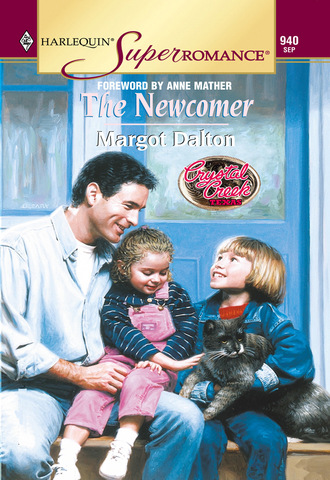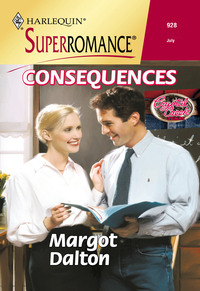
Полная версия
The Newcomer
“But my brother and I will be using two computers, a laptop and fax machine,” Maggie told him. “We need at least four phone jacks and two dedicated lines for e-mail and Internet access, or we can’t stay here.”
“And if I install them, you’ll teach me how to computerize my bookkeeping?”
“My brother’s a novelist.” She looked fully at him, her eyes grave and thoughtful. “He’s at an important point in the book he’s working on, and he needs to be able to write every day.”
“Is he published?”
“His first book comes out in late spring. He’s working on the sequel.”
“And what about you?” Doug asked. “Are you just along to nurse the creative genius, Maggie?”
Her cheeks turned faintly pink, a reaction that he found intriguing.
“Hardly.” She looked back at the screen. “I have work of my own to do.”
“In Crystal Creek?”
“You’ve never heard of networking?” she asked a little evasively. “With a computer modem and a good-quality fax, I could conduct my business from a mountaintop or a desert island.”
“Ah yes, ’tis a brave new world indeed,” he said in a soulful brogue, earning a suspicious glance from his companion.
When she frowned, a tiny vertical line appeared between her delicate eyebrows. Doug wanted to kiss it.
“So,” he asked, getting a firm grip on himself, “why have you and your brother chosen Crystal Creek as your desert island?”
She smiled, causing a dimple to flash briefly in her right cheek. He was even more enchanted.
“Maybe,” she suggested, “I’ve decided to learn the fine art of Texas cuisine.”
“And maybe not,” he said.
But she refused to rise to the bait, and before long they were fully involved again in the business of input commands and program files.
CHAPTER FOUR
DOUG EVANS WAS amazingly quick-witted, with an incisive grasp of new concepts that left her breathless.
“Let’s start putting some of this into practice,” she said at last, trying not to show how impressed she was with him. “Which part of your business would you choose to enter on the main ledger?”
“The pub,” he said without hesitation. “It makes more money than the hotel. It’s a real godsend during slow times like this.”
“And what do you consider the main areas of difficulty in your accounting?”
“Wage deductions and capital cost depreciation,” Doug said. “I’m afraid this old software has cost me a fair amount in taxes over the past few years.”
“You’re probably right.” Maggie frowned at the computer. “Now, if I can just remember where to find the Web site, I’ll be able to download the neatest program for calculating your capital depreciation. It works like magic….”
While she worked, Doug sat nearby and answered her questions until she had all the programs running in different windows. Then he got up and roamed around the lobby, sat for a while on one of the couches and leafed through a magazine, strolled into the back to lock the outside door.
“Come on,” he said at last, pausing by the desk. “You’ve been at it almost two hours, Maggie. Call it a night and have that drink with me.”
“Two hours?” she looked up at him, blinking in surprise. “Really, it’s been that long?”
He chuckled. “You love this, don’t you? I was watching you at that computer and your face was completely absorbed, like someone watching a good movie.”
She smiled and leaned back on the stool, stretching her arms. “You know, it’s really fun. Looking for the right software is like solving a mystery, or going on a treasure hunt.”
“So, are you going to find a treasure for me?”
“Well…” Maggie hesitated. “No promises, now,” she warned, “but I think you might be able to save quite a lot in taxes.”
“How?”
“Things like capital cost allowances, wage deductions and writing off some of the hotel expenses against the profit you make on the bar. This new software will help you with all that.”
He brightened. “If that’s true, I’ll have to raise your wages.”
Maggie laughed and switched off the computer. With his help she stacked the files neatly, then climbed down from the stool and followed him in the direction of the pub, which was called the Tartan Lounge.
Doug Evans had obviously been aiming for an old-world atmosphere in this part of his business, and judging by his casual statement about profits, his neighbors appreciated the effort.
The bar with its rows of colorful, gleaming bottles was topped by a crest that matched the one up in their sitting room. Bright swathes of tartan and crossed swords adorned the other walls, and a fire burned low in the big stone hearth, where Dundee drowsed in the warmth on a folded blanket.
Three young cowboys and their girlfriends were engaged in a lively game of darts, while a group of older couples chatted over cribbage boards in a corner.
The place was warm and welcoming, rich with quiet companionship, a cozy refuge from the winter night.
Doug settled Maggie near the fireplace, then went to the bar and came back with a martini, and a glass of whiskey-and-cream liqueur on ice for her. She looked at it, surprised to find he’d remembered the brief mention of her drink of choice.
Most of the men she encountered these days would have missed that comment, Maggie realized. They were usually too wrapped up in themselves and the impression they were making to pay much attention to a woman’s conversation, even when they found her attractive.
But Doug Evans seemed to be a supremely confident man. He was quiet and considerate, but gave no evidence of being worried about the impression he was making on her.
“You were joking about wages a while ago.” Maggie sipped the excellent liqueur. “And it made me wonder about something.”
“What’s that?” His hard face was highlighted softly by the flames.
Maggie could picture him as a Highland chieftain sitting near a turf fire, with his horses nearby and his warriors gathered around him.
She shivered in the grip of sudden sexual arousal, and forced her mind back to the topic.
“Do you have any full-time employees besides Rose?” she asked. “If not, the wage deductions won’t amount to very much.”
“I don’t even get a deduction for Rose,” he admitted. “She just works here to help out.”
“Why?”
“Because she’s on a visitor’s visa—not a work permit.”
“You mean she and the children are in the country illegally?” Maggie asked.
“Not exactly. But her visa is on the point of expiry, and she hasn’t been able to get it renewed.” He sighed. “It’s easier to find the Hope Diamond than get a green card.”
“Why are you telling me this?” Maggie asked curiously. “You don’t even know who I am, Doug. What if Terry and I were immigration agents, coming here to investigate your sister?”
He met her eyes steadily, with a gaze so probing that she was forced to look down at the table.
“That’s not who you are, Maggie,” he said gently. “I’m still not sure what you’re doing here, but I do know you’re not at all interested in my sister and her citizenship.”
Maggie traced the damp circle left by her glass on the shining wooden surface of the table. “You’re right,” she said. “I’m no threat to Rose.”
“So do you think I’m daft, Maggie?” he asked casually. “Opening my books to you?”
Maggie shook her head. “I never saw your numbers, not even one entry. I just offered a bit of computer software, that’s all. But I’d say your business seems pretty well managed.”
He chuckled, a pleasant sound in the cozy firelit pub. “Oh, I’m a good manager, all right. I’m just not much of a computer technician.”
She smiled at him. Their eyes met and held for a long moment, and again she was the first to turn away. “So Rose doesn’t want to go back to Scotland?”
“Not at all. Her ex-husband is a harsh, cruel bastard. He’s been abusive to Rose and a terrible influence on the girls. For the sake of the kids, she’d much prefer to keep an ocean between them.”
Maggie thought about the gentle blond woman and her two little girls. “Oh, I’m so sorry,” she said. “Do you have any family there who could help her if she’s forced to go back?”
“Our father died when we were small and our mother remarried not long after. She’s dead now, too. There’s nobody left but a stepfather. And he’s not a man who’d help either of us, not unless there might be some profit in it for him.”
“How sad.” Maggie thought about the meaning of his words, and what his childhood must have been like. “So did you come to Texas to escape all that?”
“Not at the time. I was still working in the family business then. It was soon after my mother died, and I came here in the line of duty. But once I was here, I couldn’t seem to leave.”
“It’s a long way from Scotland.”
Doug laughed. “Moira and I were just talking about the same thing. In many ways the landscape in the Hill Country is similar to the place I grew up, you know. But there’s more sunshine here.”
“It sounds like you really love Texas.”
He considered her words for a moment, sipping his drink. “Not so much as I love the town,” he said at last. “This is the first place I’ve ever felt truly at peace with the world. Crystal Creek and my hotel…” He waved his hand at the comfortable room, the flickering glow on the hearth. “It’s home to me, Maggie.”
She felt a sudden tug of uneasiness, and a deep, painful feeling of guilt over what she was doing in Crystal Creek.
“What is it?” he asked, watching her intently.
She sipped her drink, avoiding his glance. “I don’t know what you mean.”
“You have a very expressive face. And just now, you look troubled.”
“Troubled?”
He reached out to touch her forehead with a gentle hand. “Whenever you frown, you get this lovely wee line between your eyebrows.”
She ducked away from his hand and shifted awkwardly on the padded bench.
“Look, Doug,” she said with forced casualness, “don’t keep watching me so closely, all right? I’m not used to it.”
His eyebrows arched in disbelief. “You’re not used to a man watching you? That’s hard to believe, for a woman like you.”
She stared at him, genuinely surprised. “You’re kidding.”
“About what?”
“I’m quite an ordinary person, Doug. And when you get to know me, I’m not even all that nice,” she added with another pang of remorse.
“I’ll be the judge of that,” he said with a gaze so warm that she felt the color rise in her cheeks again.
“Now it’s your turn,” he told her after an awkward silence.
“Me?”
“What’s the story of your childhood? Did you grow up in California?”
She shook her head. “Terry and I were raised on a farm in Ohio. We didn’t move to California until we were adults.”
“I see. And what took you from Ohio to the Golden Coast?”
She thought about the question. “Well, mainly the fact that we had a patron who sponsored our college education out there. Like you, we’d lost both our parents by the time we reached our late teens.”
“I’m sorry,” he said with genuine sympathy. “That’s a hard road, I know.”
“But our situation was the opposite of yours,” Maggie said. “Our mother died of ovarian cancer when I was seven and Terry was five. Our father did such a wonderful job of raising us on his own,” she added with a fond, faraway smile. “He worked all day on the farm, and then at night he was a mother to us as well, doing laundry and packing school lunches.”
“I never knew what it was to have a loving father,” Doug said. “I can’t even remember mine.”
“Daddy was our hero. And then when we were in our mid-teens and his life was starting to get a little easier, he was killed in a tractor accident on the farm.” Her eyes stung with unshed tears. “It was just a careless mistake,” she said, swallowing hard. “He took a shortcut up an incline behind the barn, and the tractor flipped over on him. He was pinned there all alone for most of the day. By the time we got home from school and found him, it was too late.”
“I’m so sorry, Maggie.”
Doug covered her hand with his own and waited for her to compose herself.
“Do you look like him?” he asked, clearly trying to set her at ease again. “You and your brother are not at all alike.”
Maggie hesitated, surprised by how easy it was to talk with this man. These were topics she almost never spoke about, even with people she’d known for a long time.
“Actually,” she said, “I was adopted. My birth mother was a high-school girl from Cincinnati. She was sixteen years old, an honor student and a talented musician. When she got pregnant, her family forced her to carry the baby to term.”
“And that baby was you,” he said, his voice rough with emotion.
“Yes, it was me.”
He released her hand, and she was almost sorry. Again she marveled at how comfortable she felt, wrapped in this semilit intimacy with a man she barely knew, talking about the most emotional parts of her life.
“My adoptive parents wanted a baby for years before I came along,” she said in a low voice. “They made me feel so loved and wanted. It was part of the family history, how they got the call about the baby and they were so excited, packing up the little clothes they’d been saving all that time, and driving to Cincinnati to get me. I was nine days old when they took me home.”
Doug smiled, his face so warm and tender that Maggie had to fight the urge to reach out and lay a hand on his cheek.
“So what about your brother?” he asked. “Was he adopted, too?”
Maggie laughed and shook her head. “No, it was one of those classic cases. They’d been married ten years when they got me, and never been able to conceive. But a little over a year after I arrived, my mother got pregnant. They were so happy. Terry and I have been good pals all our lives.”
“So you had a nice childhood, happy and loved on a farm in Ohio.”
“Yes,” she said. “I really did.”
“I’m glad to hear it. I like to think about you growing up like that.”
The physical attraction between them had grown almost palpable. Maggie was afraid that if she stayed with him any longer, he’d invite her to his room and she wouldn’t be able to resist.
And that would be a huge mistake, something she certainly couldn’t afford at this point.
“Well,” she said with false brightness, “thanks for the drink and the nice conversation, Doug. It’s getting late, and I’d better head upstairs.”
He didn’t press, though his eyes burned a deeper green as he watched her get to her feet.
“Good night,” he said courteously. “I’ll see you in the morning. Do you think we can do some more work on those computer programs?”
“I should be free in the morning,” she said.
“That’s great.” He raised his glass in a quiet salute. “Until then, Maggie.”
Her knees felt suddenly weak. As she headed for the door, every part of her body was conscious of him watching her leave.
MAGGIE WAS UP early the next morning, drying her hair in the bathroom. A knock sounded on the door and she padded through the sitting room in her terry-cloth robe to admit a skinny young man in blue overalls, carrying a metal tool kit and a big spool of wire.
Dundee pressed by the man’s legs, then stepped daintily into the room and looked around with a proprietary air.
“Phone jacks and new lines,” the young man said curtly, moving past Maggie into the room. “Doug said you could tell me where they should go.”
“Phone jacks!” Terry said in delight.
He sat at the round table in the sitting room, where he squinted at the flip-up screen of his laptop.
“This is great. Maggie, your Scotsman is a man of his word.”
“Hey, I’m buying this technology with hours and hours of my time.” Maggie watched as the young man crawled around on the floor and tapped the wide oak baseboards with a hammer.
“And you’re loving every minute of it,” Terry told her. “There’s nothing you enjoy better than playing with computer software. Especially,” he added in a teasing undertone, “when there’s information you want.”
Maggie frowned at him, then turned to the phone technician. “We’ll want an outlet over there,” she said, pointing, “for our fax machine, and another one here by the table. And one in each bedroom under the window, if you can manage it. I think that would be the logical place, don’t you?”
“Okay.” The man popped a stick of gum into his mouth. “So where should I start?”
“In the other bedroom.” Maggie indicated Terry’s room. “I’ll be dressed in a minute, and then you can work anywhere you like.”
She hurried back into her own room, put on jeans, a white cotton shirt and moccasins, and dabbed on a bit of makeup.
Before she was finished she heard more arrivals in the sitting room, followed by the whir of equipment and the high-pitched voices of children.
Maggie pulled her hair back into a ponytail, pinned it on top of her head and went out to find Rose Murdoch, in khaki shorts and flowered apron, running a vacuum cleaner around the sitting room, followed by Moira, who plied a feather duster on every exposed surface.
Robin was there as well, squatting next to the phone technician. She had apparently been given the task of helping him, because she held a screwdriver and a couple of drill bits, and looked rigid and solemn with responsibility.
Terry had given up his work to move aside heavy pieces of furniture for Rose to run her vacuum underneath.
Normally her brother hated being interrupted when he was writing, but today he seemed calm in the midst of the uproar.
After they moved the couch back in place, Rose ran a hand over her forehead and gave Terry a shy, grateful smile. He beamed down at her so warmly that Maggie was a little startled.
“Terry, do you want to work in my room?” Maggie called over the roar of the vacuum. “It’s a lot quieter in here.”
“That’s okay.” Terry gave his sister an unabashed, cheerful grin. “I’ve just made a deal with Rose. If I help her with the vacuuming, she’ll make breakfast for me down in the bar.”
“It seems the Embree and Evans clans are making a lot of deals these days,” a deep voice commented from the hallway.
Doug entered, looking more handsome than ever in his jeans and shirt.
Maggie glanced around, unnerved by the way he seemed to fill the room. “My goodness,” she said with an awkward laugh. “There are seven people in here now, and one cat.”
“Are there really?” Doug grinned at her. “Then let’s remove a couple of these bodies, shall we?”
“You and me?” Maggie asked as he paused close by her side. His eyes were richly green in the morning sun, and so bright they were hard to look at.
“I was hoping you could give me a minute. I’ve run into a nasty snag in that program you installed,” Doug told her. “It won’t bring up any data entries prior to 1998. I need your help to unlock the thing.”
“Already? What a slave driver,” she said lightly, though she was excited and a little uneasy to have him so near.
“Hey, I’m already keeping my part of the bargain, right?” He indicated the technician with his small assistant.
“Doug, I haven’t even had breakfast yet.”
“Just as well. Nora sent a plate of her famous biscuits and some homemade jam. I’m hoping you’ll have breakfast with me.”
“But I…” Maggie glanced around in distracted fashion.
Rose and Terry had moved into the other bedroom with their cleaning equipment. Moira was with them, still dusting.
Maggie heard a steady hum of conversation over the noise of the appliance, accompanied by occasional bursts of laughter.
Terry, it appeared, was getting along very well with the local populace.
“Robin, I need that yellow screwdriver,” the technician said, frowning at a hole he’d drilled in one of the baseboards.
Solemnly, Robin handed over the proper tool, then gave Maggie and her uncle a proud smile.
“It looks like everything’s under control up here,” Doug said, taking Maggie’s arm. “By lunchtime you’ll be able to establish a Pentagon office in this suite if you want to. For now, come downstairs and have some breakfast with me.”
“And help you with your computer problem,” Maggie said dryly.
“Well, since you’re going to be nearby anyhow…” He gave her a boyish grin.
She didn’t resist further, mostly because it was so pleasant to feel his hand on her arm. A treacherous part of her wanted to nestle closer, and see if his long body was as hard and muscular as it looked.
Horrified at herself, Maggie suppressed the dangerous thought.
As they neared the lobby with the cat at their heels, a delicious aroma of fresh coffee and hot baking drifted up the stairs.
“Oh my,” she said. “Doesn’t that smell wonderful? By the time I leave here, I’m going to weigh two hundred pounds.”
A phone rang behind the reception desk. Doug vanished into his office and returned a few moments later, tucking a folded piece of paper into his shirt pocket.
“And when will that be, Maggie?” he asked quietly, lifting the little gate so she could walk behind the reception desk.
“Beg your pardon?” She perched on one of the stools and looked hungrily at the carafe of hot coffee, the platter of fluffy biscuits.
Doug poured her a cup of coffee and offered the biscuits, along with napkins and utensils.
“How long will you be staying, Maggie? And what,” he asked with a sudden steely edge to his voice, “exactly are you doing here?”
Maggie tensed, but forced herself to sip coffee and butter one of the biscuits with a casual air. “Well, the fact is, at the moment I’m working on a little research project of my own,” she said. “Why do you ask?”
He settled onto the stool next to her and helped himself to a biscuit.
“Because Ralph Wall’s been telling everybody within a fifty-mile radius that you’re working for a movie producer who’s planning to buy up all the real estate and shower the place with money. I was hoping you might want to tell me what’s really going on.”
Конец ознакомительного фрагмента.
Текст предоставлен ООО «ЛитРес».
Прочитайте эту книгу целиком, купив полную легальную версию на ЛитРес.
Безопасно оплатить книгу можно банковской картой Visa, MasterCard, Maestro, со счета мобильного телефона, с платежного терминала, в салоне МТС или Связной, через PayPal, WebMoney, Яндекс.Деньги, QIWI Кошелек, бонусными картами или другим удобным Вам способом.






